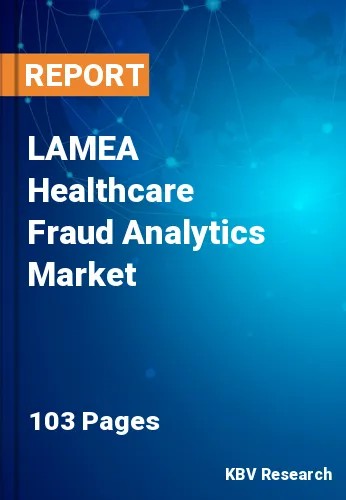The Latin America, Middle East and Africa Healthcare Fraud Analytics Market would witness market growth of 25.4% CAGR during the forecast period (2022-2028).
Medicaid has been one of the most sensitive parts for fraud in recent years. Due to a lack of cross-program communication, a scattered management approach, and a difficult-to-follow patient group of low-income people and their children, this is the case. Effective fraud analytics solutions can assist in lowering these high expenses.
Illegal medical billings including forged claims, multiple claims filed by multiple providers for the same patient, patient identity theft and use for reimbursement, and collusion between unethical clinicians and their patients are just a few examples of prevalent healthcare fraud.
From a patient's zip code to a physician's qualifications, big data has a huge amount of information. To discover fraudulent tendencies, insurers can manually review and compare populations and providers, but contemporary data analysis systems can typically spot fraud automatically. Naturally, the bigger the data set, the more useful it is. Data that presents a complete picture of a situation and contains all elements that may be impacting the data is required for precisely detecting fraud and waste.
The LAMEA region requires the incorporation of healthcare fraud analytics system in every healthcare institutions because now other relevant policies and regulations are not enough to combat the frauds committed by the statutory authorities that are responsible to monitor healthcare frauds as well as impose the fines on the violators. The Investigators of healthcare frauds are observing more and more collusion type frauds that are committed by both combined healthcare professionals and patients. One of the biggest obstructions to the fight against healthcare fraud is the dearth of good legislation along with the incapability to reinvest seized funds in the healthcare systems.
The Brazil market dominated the LAMEA Prescriptive Analytics Market by Country in 2021, and would continue to be a dominant market till 2028; thereby, achieving a market value of $28.6 million by 2028. The Argentina market is estimated to grow at a CAGR of 26.6% during (2022 - 2028). Additionally, The UAE market would experience a CAGR of 25.6% during (2022 - 2028).
Based on Delivery Model, the market is segmented into On-premise and Cloud. Based on Application, the market is segmented into Insurance Claim Review, Pharmacy billing Issue, Payment Integrity, and Others. Based on End User, the market is segmented into Public & Government Agencies, Private Insurance Payers, Third-party Service Providers, and Employers. Based on Solution Type, the market is segmented into Descriptive Analytics, Predictive Analytics, and Prescriptive Analytics. Based on countries, the market is segmented into Brazil, Argentina, UAE, Saudi Arabia, South Africa, Nigeria, and Rest of LAMEA.
Free Valuable Insights: The Global Healthcare Fraud Analytics Market is Predict to reach $6.6 Billion by 2028, at a CAGR of 23%
The market research report covers the analysis of key stake holders of the market. Key companies profiled in the report include Wipro Limited, IBM Corporation, DXC Technology Company, SAS Institute, Inc., Conduent, Incorporated, HCL Technologies Ltd., UnitedHealth Group, Inc. (Optum, Inc.), OSP Labs, Cotiviti, Inc., and ExlService Holdings, Inc.
By Delivery Model
By Application
By End User
By Solution Type
By Country
Our team of dedicated experts can provide you with attractive expansion opportunities for your business.

